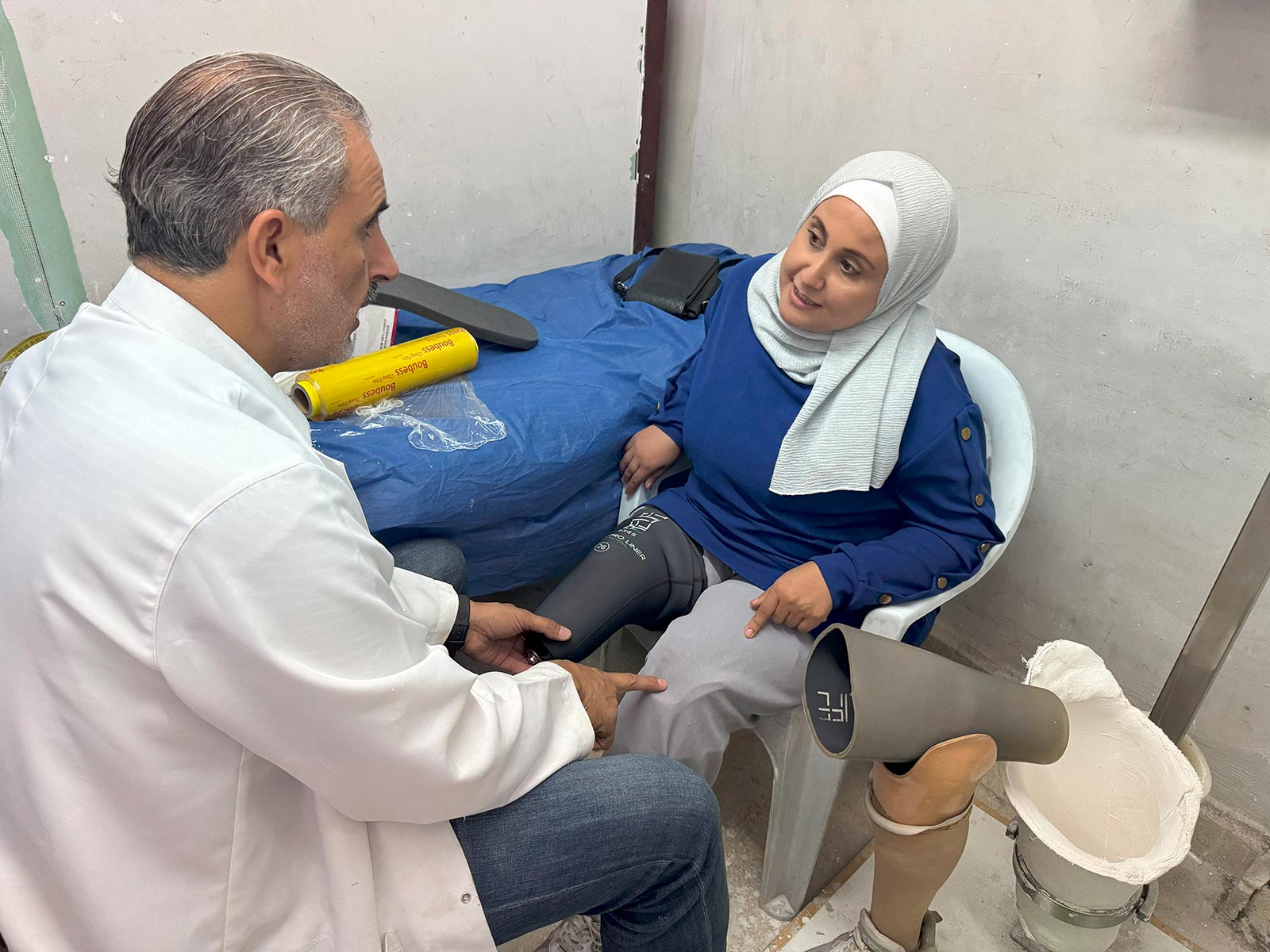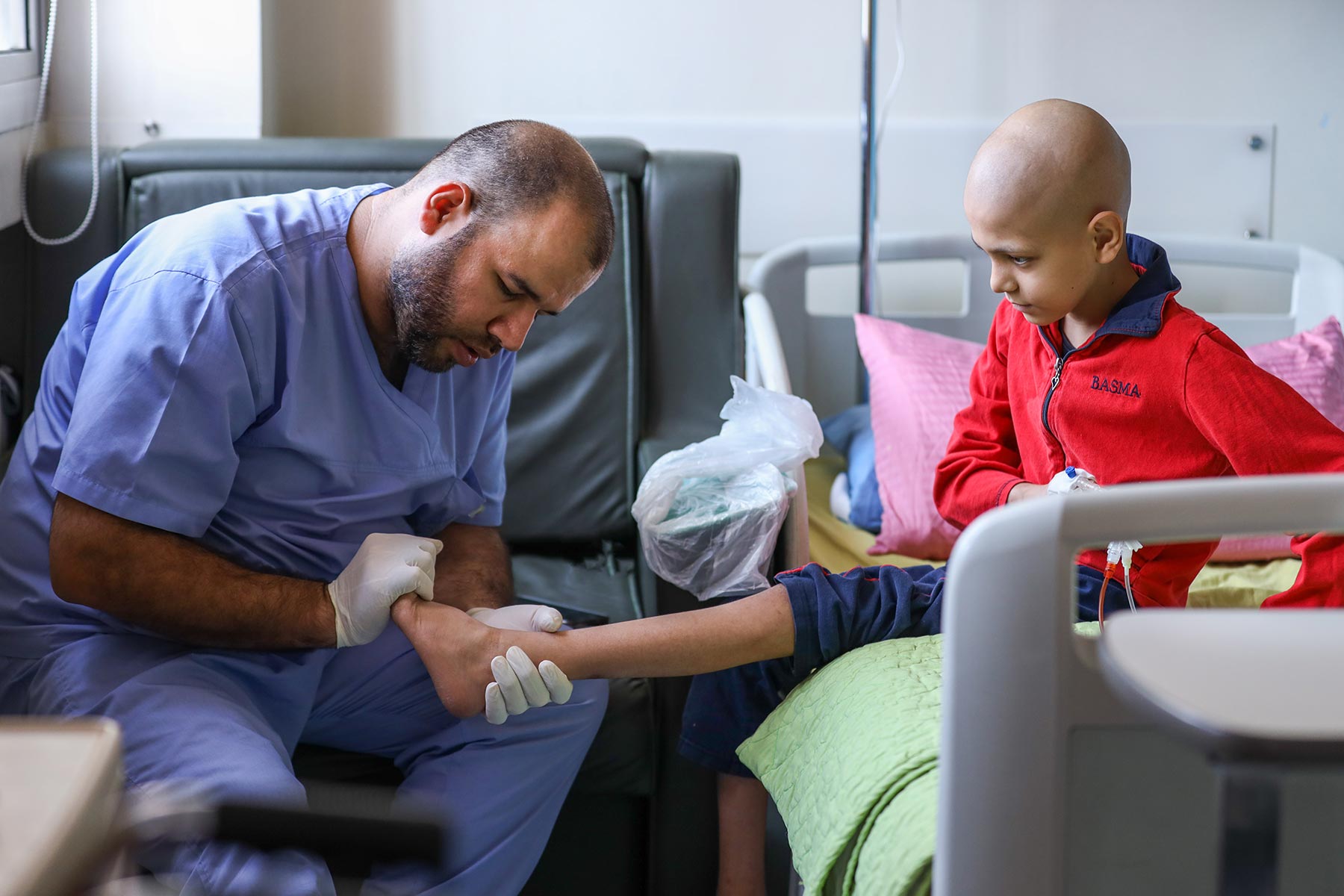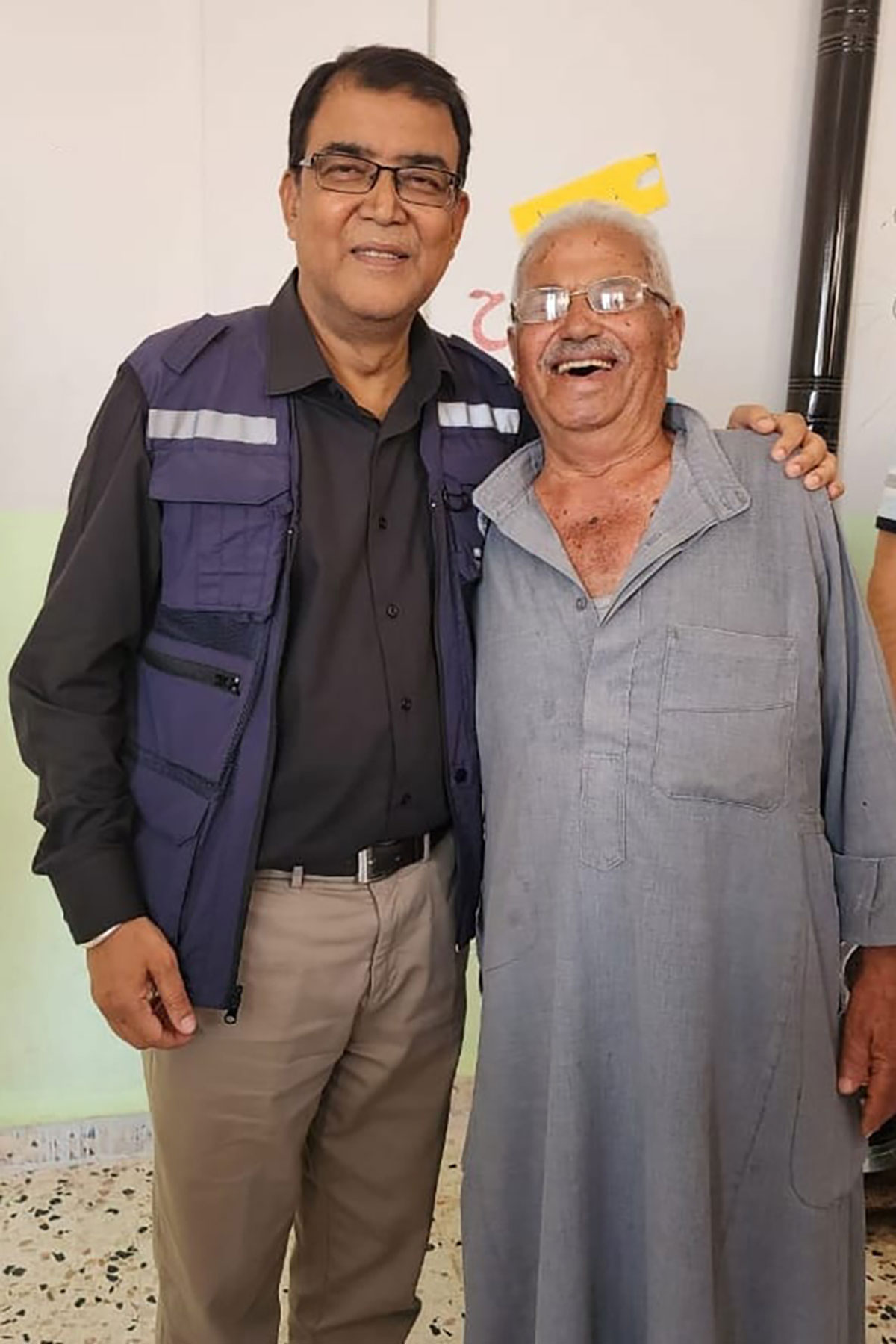WHO secures US$ 5.5 million from CERF to boost emergency health response in Syria
6 October 2024 – The World Health Organization (WHO) welcomes the US$ 5.5 million funding received from the United Nations Central Emergency Response Fund (CERF) to enhance its integrated multisectoral emergency response in Syria. The funding will enable WHO to continue delivering life-saving healthcare services to the most vulnerable populations in conflict-affected regions of the country.
The support aims to reduce morbidity and mortality by ensuring access to essential health care, including advanced nutrition services, and by delivering health services to people in need in north-west Syria and north-east Syria, including sub-districts in Aleppo, Al-Hasakeh, Dar’a, Deir-ez-Zor, Idleb and Lattakia.
“We are grateful for CERF’s continued support in addressing urgent health needs in Syria, particularly in this critical time where needs are increasing day-by-day” said Dr Iman Shankiti, acting WHO Representative to Syria. “The funding will enable WHO to restore and strengthen critical health care services and respond to severe malnutrition cases in the most hard-to-reach and underserved areas of the country.”
The funding will support an estimated 1.8 million people in prioritized areas, aiming to improve access to primary and secondary health care, bolster emergency referral systems – with a focus on children with malnutrition, provide essential supplies to nutrition stabilization centres and hospitals, and strengthen the capacity of local health care workers on mental health, gender-based violence, and communicable diseases.
“The greatest strength at WHO is our ability to reach people in need, no matter how remote or challenging the circumstances. We are thankful to CERF for enabling us to cover critical gaps in the healthcare system in north-west Syria, where we often must make painful decisions to prioritize the most vulnerable,” said Ms Rosa Crestani, Head of Office, WHO Gaziantep in Türkiye.
Through this generous contribution, WHO, in collaboration with local health authorities and NGOs, will address the immediate health needs of communities across Syria - including internally displaced persons, returnees, and other vulnerable group. This comprehensive response will save lives and help stabilize healthcare systems in the areas most affected by the ongoing conflict and the worsening situation in Syria.
Throughout WHO’s response, the funding will also be utilized to build local capacities through risk communication and community engagement (RCCE) activities and tackle sexual exploitation and abuse, helping to ensure that protection and accountability remain central to the humanitarian response.
Jehan's story: the life-changing impact of timely medical care during conflict
 Jehan receiving free maintenance for her artificial limbs at the Rehabilitation and Artificial Limbs Centre. Photo credit: WHO Syria.17 September 2024, Damascus, Syria – Improving Diagnosis for Patient Safety, the theme of this year’s World Patient Safety Day – observed annually on 17 September – calls global attention to the critical need for timely and accurate medical care. It is a message that resonates deeply in conflict-affected Syria.
Jehan receiving free maintenance for her artificial limbs at the Rehabilitation and Artificial Limbs Centre. Photo credit: WHO Syria.17 September 2024, Damascus, Syria – Improving Diagnosis for Patient Safety, the theme of this year’s World Patient Safety Day – observed annually on 17 September – calls global attention to the critical need for timely and accurate medical care. It is a message that resonates deeply in conflict-affected Syria.
The experience of Jehan, a 38-year-old woman from Al-Dhiyabiya in Rural Damascus, provides a reminder of the devastating consequences of delayed care. Jehan’s life changed in 2012 when conflict reached her neighbourhood. Returning home to retrieve essential items for her children, Jehan was severely injured by a shell. When she finally reached Al-Mouwasat Hospital in Damascus the doctors who examined her had no choice but to amputate both her legs.
"I spent two months in the hospital, grappling with the physical and emotional trauma of losing my legs. To make matters worse, my husband went missing and I haven’t heard from him since. The transition from being an active mother and wife to someone who needed constant help was incredibly difficult," said Jehan.
During her treatment at Al-Mouwasat Hospital, the possibility of prosthetic limbs was mentioned and Jehan received a referral to the WHO-supported Rehabilitation and Artificial Limbs Centre in Damascus. Overwhelmed by despair at her situation, Jehan didn’t visit the Centre until 4 years later when, with her family's support and accompanied by her mother, she finally went.
"The doctors were extremely supportive. They immediately took measurements for my prosthetics, which were provided free of charge and fitted within a week. I received a month of training at the Centre on how to walk with my new limbs," said Jehan.
Dr Iman Shankiti, acting WHO Representative to Syria, highlighted the importance of WHO support for the Centre since 2015, stating: "WHO’s continued assistance to the Rehabilitation and Artificial Limbs Centre is essential, especially as the crisis increases demand. Psychosocial support is also crucial to provide comprehensive care for these patients”.
Today, Jehan leads a more independent life. She works at a bag-printing shop to support her children and says she feels "an empowered woman again”.
Head of the Rehabilitation and Artificial Limbs Centre Dr Rafif Dahia said: “Our centre has become a lifeline for Syrians with disabilities. We've grown from treating 15 patients a month in 2001 to managing 50 to 60 cases today. All services are provided free of charge”.
In 2023, WHO’s support helped over 1350 people receive prostheses and 640 staff members were trained or retrained to ensure continuation of this essential work.
Jehan's story is a testament to the resilience of the human spirit and the power of timely medical care. As we observe World Patient Safety Day 2024, Jehan’s journey from injury to recovery serves to underline the critical role that access to health care and accurate diagnosis play in preventing lifelong disability.
Thaer Al-Ali: nursing on the frontline
 Photo caption: Thaer Al-Ali at BASMA Association in Rural Damascus, Syria providing healthcare for a young cancer patient. 1 September 2024, Damascus, Syria –Thaer Al-Ali is a nurse at the BASMA Association in Syria’s Rural Damascus governorate. He is part of a team caring for children with cancer.
Photo caption: Thaer Al-Ali at BASMA Association in Rural Damascus, Syria providing healthcare for a young cancer patient. 1 September 2024, Damascus, Syria –Thaer Al-Ali is a nurse at the BASMA Association in Syria’s Rural Damascus governorate. He is part of a team caring for children with cancer.
“Every day starts early. By the time I arrive at work the weight of the day’s responsibilities are already pressing on me. The first task is a debriefing meeting with colleagues during which we discuss the patients’ conditions and treatment plans. We care for children with life-threatening illnesses and the meeting is crucial to prepare for the day ahead.
“I witness heart-wrenching cases. We provide both medical care and emotional support for patients and their families.
“Few people understand the dangers health care workers face in Syria. Sometimes we risk our lives to do our jobs.
“Between 2014 and 2018 I used to commute to Al-Biruni University Hospital in Harasta, one of Rural Damascus’s more dangerous areas. Each day I had to decide whether I would stay home, in which case I would have been neglecting my patients, or risk my life by going to work, fully aware of the dangers posed by snipers and gunfire. Sadly, it was common to hear about colleagues being injured or killed while commuting to or from the hospital. Every morning, I felt uncertain. Yes, I might make it to work today but tomorrow could be a different story.
“Despite the constant fear, we never stopped. I was there to assist the patients, especially the children, overcome their illnesses. It was their courage, their smiles, their simple words of ‘thank you’ that helped me through the tough times. The atmosphere was emotional, filled with reassurance and love. Losing a child during treatment is like losing part of your soul.
“I remember taking a young girl to surgery. Her mother, who was at the hospital entrance, was hit by shrapnel from a mortar. We were shocked to see the mother being rushed in instead. Thankfully, both the girl and her mother survived. These are the stories we lived through.
“Today, the situation in Syria has improved but the economic crisis is severe. Many people struggle to afford the basics needed to survive. I am grateful that we can provide free treatment, supported by health partners like WHO.
“Being a nurse in Syria is more than a profession, it is a mission to bring hope and healing to those in need, no matter the circumstances. We are defined by our dedication, which drives us every day in this resilient nation where hope is often the only medicine on offer.”
Abu Sary’s lifelong dedication to immunization
 Abu Sary is pictured with WHO staff in July 2024 during the 2nd round of the Big Catch-up vaccination activity in Al-Saan health center, Suqaylabiyah, Hama Governorate.27 August 2024, Damascus, Syria – On 28 May 2024, delegates of the Seventy-seventh World Health Assembly took part in a special high-level event to celebrate 50 years of immunization progress – honouring achievements, embracing innovation and envisioning the future. The event was to commemorate the 50th anniversary of the Expanded Programme on Immunization (EPI).
Abu Sary is pictured with WHO staff in July 2024 during the 2nd round of the Big Catch-up vaccination activity in Al-Saan health center, Suqaylabiyah, Hama Governorate.27 August 2024, Damascus, Syria – On 28 May 2024, delegates of the Seventy-seventh World Health Assembly took part in a special high-level event to celebrate 50 years of immunization progress – honouring achievements, embracing innovation and envisioning the future. The event was to commemorate the 50th anniversary of the Expanded Programme on Immunization (EPI).
As WHO marks this milestone, it is important to acknowledge the health worker heroes who have worked tirelessly to protect public health. One such hero is Abu Sary, from Salamiyah, Hama, Syria. His lifelong dedication to vaccinating the children of Bedouin tribes has significantly improved health in his community.
Born into a Bedouin family, Abu Sary has always understood the unique challenges of his people. After graduating in 1967, Abu Sary joined the health department in Salamiyah. His purpose was clear: to bring to the nomadic Bedouin families the essential health services they often missed out on.
From 1967 to 2004, Abu Sary worked with mobile vaccination teams. He educated Bedouin families about the importance of vaccination, facilitated their access to public services and earned their trust. This trust was crucial to his mission to ensure that children received the essential vaccinations they needed.
Abu Sary consistently went above and beyond his duties. Each week, he would travel with mobile vaccination teams to Bedouin areas on Saturdays, Sundays and Mondays, often staying overnight to ensure that all vaccines were administered. On Monday evenings, he returned to Salamiyah to refill his car with fuel and collect more vaccines, before continuing to visit different Bedouin areas until Thursday. His commitment to working away from home showed his deep dedication to the health of the Bedouin people, who trusted him as one of their own.
After retiring in 2004, Abu Sary remained an influential figure in vaccination promotion in Salamiyah and the surrounding deserts of Hama, Homs and Ar-Raqqa. For many years, he continued to know the vaccination status of every Bedouin child, and he would help mobilize community members for vaccination activities.
In 2024, Abu Sary supported the Big Catch-Up vaccination activities conducted in April and July, which reached and screened the vaccination status of more than 26 000 children aged under 5 years across Syria. His efforts directly helped to vaccinate more than 160 zero-dose children in the Salamiyah area, most of them living in remote and high-risk areas.
Today, Abu Sary’s daughter is pursuing a career in health care that involves administering vaccinations, inspired by her father’s commitment to the cause. His enduring influence ensures that his mission to protect public health continues.
Abu Sary’s efforts have saved numerous lives, and his story exemplifies how one individual can truly make a difference through commitment and service. Abu Sary is not only a health worker, but also an immunization hero.


